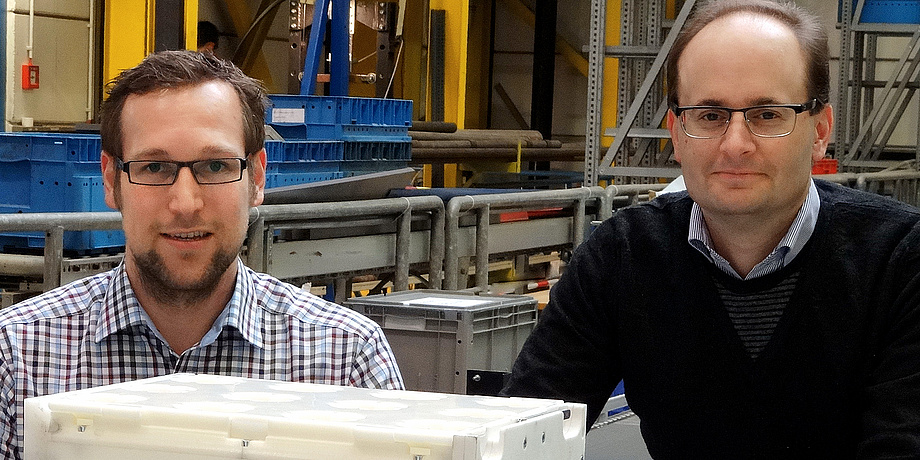Community project
In a joint European endeavour, amalgamated under the EU technology platform ALICE, responsible for driving the idea forward internationally, logistics is being re-thought from the ground up. Synchronised deliveries, a joint transport network among long competing dealers and logistics companies – in short, an overarching view of logistics and supply-chain planning and control ought to guarantee a fast, efficient, flexible and eco-friendly exchange of goods. The 4th International Physical Internet Conference (IPIC) 2017, which TU Graz’s Institute of Logistics Engineering has brought to the Styrian provincial capital in the framework of the conference series “Logistikwerkstatt Graz” (logistics workshop Graz), will advance the exchange of expertise between science and industry.Trends move logistics
But what makes the topic so explosive that in addition to the ALICE platform, the Federal Ministry of Transport, Innovation and Technology (bmvit), the City of Graz, the State of Styria, all the Austrian intralogistics suppliers and many other internationally active corporate groups are supporting the conference, and national and international top-class speakers are following the call to Graz?Seven big social trends and strategies are close to combining forces for a really integrated system of sustainable and efficient logistics:
- Politics and society are moving in the direction of a low-carbon, energy-saving circular economy. If fuel consumption and emissions are to be lowered, then exclusively self-serving distribution centres of large-scale goods dealers as well as heavy goods vehicles and containers which journey half empty are not fit for purpose. The aims of the no longer running <link http: www.modulushca.eu _blank int-link-external external link in new>EU research project MODULUSHCA, whose coordination was located at the Institute of Logistics Engineering, were to counteract the increasing CO2 pollution in goods transport using a standardised, modular container system, synchronised deliveries, a joint transport network and shared load capacities
- Social networks and electronic market places are increasingly leading to shared economic forms. This new business model is a determining factor in the traffic and transport system, just like the online agency service “Uber”, which coordinates persons on shared journeys. New electronic systems also make it possible to share infrastructure in freight transport.
- Demographics show that Europe is heading towards an ageing society. And mobility patterns and workloads are changing accordingly. There is a demand for new services in passenger transport, and ergonomic, automated logistics systems have to support people.
- Electronic trade in Europe is growing unbelievably fast. Both e-commerce companies and traditional trading outlets increasingly require transport systems in cities to be able to deliver packages. The “last mile” is gaining in importance in logistics: this is the path from the big distribution centres outside cities to the receiver. Graz, in particular, with its historic inner city is a challenge here, and the city government increasingly administers to needs in this area.
- E-commerce and customised product manufacture is leading to smaller dispatch sizes but with increased frequency – a big challenge for an efficient and sustainable logistics. Courier express package services showed 10 per cent growth in the business-to-consumer area in Austria in 2016; and turnover in Germany was 18.5 billion euros. Forecasts beyond 2020 show a continuing trend.
- The integration of transportation supports strategies at a European level. The 2011 transport white paper of the European Commission provides for a standardised European traffic area by 2050. The core aims include among others increasing mobility, eliminating main obstacles in core regions, and reducing dependence on crude oil imports. Increasing freight, mainly by road, can only be dealt with by means of an increase in efficiency and not by an increase in the number of journeys.
- The rapid development of new technologies, such as Industry 4.0., 3D printing, automation, robotics, the internet of things and big data, is an answer to a changing world. All these have wide-ranging effects on the logistics of the future. This can be located in the Physical Internet, and especially in the internet of things and big data.
IPIC 2017 will make an important contribution to the realisation of the Physical Internet – everything stays in motion! I’m excited about the results of the conference and I’d be happy to share them in another News+Stories article.
About Christian Landschützer
Christian Landschützer graduated from Montanuniversitaet Leoben as a mechanical engineer. 2000 he went over to Graz University of Technology for PhD studies and graduated in 2004. Following his Habilitation in 2016 he is currently working at the Institute of Logistics Engineering (ITL).His research is focused on:- Computer aided engineering (CAE) for logistics
- Engineering methods development for logistics
- Logistics technology product development and testing
